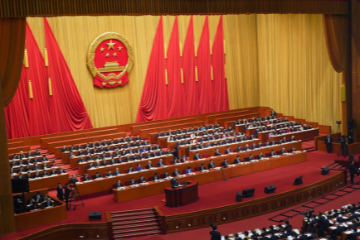It was Sri Lanka Foreign Minister G L Peiris, who quoted Mary Robinson, the former UN Commissioner for Human Rights, at a Colombo function in August, to say in the context of the Justice Gladstone report on the excesses in Palestine's West Bank and Gaza: "This is an exercise not in human rights, but in politics." Prof Peiris, a constitutional expert, was incidentally delivering the key-note address after Defence Secretary Gotabaya Rajapaksa had released the report titled, "Humanitarian Operation - Factual Analysis", countering the Darusman Report of the UN Secretary-General's expert panel and the 'Channel 4' video footage on 'war crimes' in Sri Lanka.
In the days that have followed since, President Mahinda Rajapaksa himself has taken the battle to the camp of the international community, even more. Ahead of the re-scheduled Sri Lanka visit of US Assistant Secretary of State, Robert Blake, the half-yearly meeting of the UN Human Rights Council at Geneva, and his own proposed presence at the UN General Assembly later in the year, President Rajapaksa told a Colombo audience, as much: " "It is regretted that the very individuals and institutions that point their fingers at us for the defeat of terrorism seem to be unaware of the truth about our prolonged battle against terrorism and the very nature of those terrorists. Have they no concern for the truth about Sri Lanka's agony and the humanitarian actions that under-scored our battle against terrorism? Have they no interest in the truth?".
President Rajapaksa went on to indicate that the defeat of the LTTE in Sri Lanka "has eradicated terrorism from our country. In doing so, we have made South Asia too, safer from terrorism." Further still, he left not much room for guessing whom he was addressing: "We have achieved this with much less of the assets and none of the deceit and duplicity of those who have been waging a 'War on Terror' for more than a decade, those with much more economic and fire-power than we had and many more allies than we ever had, but are still caught up in the killing fields made by un-manned drones and other lethal devices that attack civilians too… Yet, there are loud voices raised against us on accountability. To most of these voices, accountability is only a verbal apology for civilian deaths that are dismissed as collateral damage in heavy bombings. Are their actions fair by all concerned?"
In doing so, President Rajapaksa also went beyond the pale of war on terror and war-crimes, to apportion blame on the West for putting global economy on a grave crisis, without naming any nation. "The world is today engulfed in one crisis after another. Whole regions and continents suffer the effects of unregulated and wasteful expenditure with unacceptable levels of national debt pushing more societies into costly bail-outs." On another occasion, a fortnight earlier, Foreign Minister Peiris had referred to the fast recovery made by the Sri Lankan economy (in comparison?). "What is now happening is that these forces are transferring their initiatives from the arena of battle to the field of international action," Prof Peiris said in a speech at the General Sir John Kotelawala Defence University, on 18 August. "There is no need to be on the defensive at all," he added, in the context of the post-war economic resurrection of his nation.
Caught in a bind?
Clearly, the international community is getting increasingly caught in the bind as much as the Sri Lankan leadership has been, over the past months. Sri Lanka may not be unaware of the limitations that international allies like China and Russia, both with veto-power in the UN Security Council, have in defending it - not to mention their limited interest in espousing Colombo's cause on their own. Pushed to the wall, and its war-time revival of the Sri Lanka/Sinhala 'national pride' after a long time, the Rajapaksa leadership has begun hitting back in as many words as it gets from the international community. Rather, the leadership may have already put itself in the unenviable position of having to balance between self-perceptions of 'national pride' and the limitations imposed on the political and diplomatic fronts in terms of making up with the rest of the world.
In times of war, it achieved the feat at its own initiative, going as far as to thumb the nose at the international community, by talking more and more about 'national pride', while on a winning streak. Today, it has been able to do so, by pushing the divided political Opposition nearer home on the defensive, as the latter finds it hard to hit back when the national discourse is on issues of pride and patriotism. Having lost election after election, before, during and after the conclusion of 'Eelam Warr IV', all Opposition parties barring the Tamil National Alliance (TNA), have lost whatever credibility they may have had in pointing an accusing finger at the Government and the Rajapaksa leadership. They now badly need an electoral victory to have some acceptance to criticize the Government on sensitive national issues that go beyond their continuing charges of corruption and lawlessness, which now include oil and cement scams, and also the 'grease devil' episodes. However, campaigning for the Opposition UNP for the municipal councils polls in the prestigious national capital of Colombo and Sinhala-Buddhist religious/cultural capital of Kandy, Ranil Wickremesinghe, has been asking dis-spirited party sympathisers to vote for the party - this time, not necessarily to save the nation but the very party itself. At least, he has now got his priorities right, and seems to be acknowledging that the UNP would be in graver peril than at all times in the past if it did not win either, if not both the major population centres in the country where it had held sway in local government elections in the past.
Message for India
Sri Lankan civilians, academic community and others in recent times have begun referring to the 'Arab Spring' and the more recent fall of the Gaddafi leadership in Libya, and draw parallels to the anti-corruption movement, flagged across South Asia, by the 11-day fast of civil rights activist Anna Hazare. Newspaper reports have indicated increasing interest in the Indian movement in neighbouring countries, but in Sri Lanka, the reaction was two-fold. From the civilian side, there is hope that India would set the precedent for a mass movement of a similar kind in their country. This section is not sure of the identity or qualities of a leader - social, and possibly not political - who would be acceptable to the larger sections of the society, divided as they are on ethnic lines, into Sinhalas and Sri Lankan Tamils, Muslims and Upcountry Tamils.
The other section would want India to draw its lessons from two simultaneous factors, and they argue their case with equal vehemence and purported logic. To this section, the Hazare movement, as also the new stirrings on the ethnic front in Sri Lanka, with reactions, reflections and possible consequences for India, were aimed at weakening/de-stabilising the latter and also upsetting the revived bonhomie between the two South Asian neighbours in the shared Indian Ocean waters. They see in the Tamil Nadu visit of US Secretary of State Hillary Clinton recently, and her discussing the 'ethnic issue' with State Chief Minister Jayalalithaa as a precursor for events to come. However, they are either unaware or unmindful of the visits undertaken by successive US Presidents to various Indian States, and their meeting with the respective Chief Ministers.
Dividing line
There is problem everywhere in discerning one issue from the other, and the international community does not seem to be exempt from it. But by focusing excessively on 'war crimes' and issues of accountability, the international community (read: West) may have taken Sri Lanka away from the political negotiations for power-devolution to the Provinces, particularly the Tamil Province(s). This has meant that the issue has been moving increasingly away from the 'national question' to 'national pride', where the Sinhala political Opposition has a 'sullied record' while in power in the past, and has been stupefied into not reacting, owing to the issues involved, concerns unexpressed, and consequences in electoral terms. So much so when the TNA asked the Government to come up with its written proposals before returning to the negotiations, the political reaction within the country was muted. And whoever was speaking was speaking on 'war crimes' issues - and against it. The TNA, left with little choice but to let off steam too has been maintaining a sullied but studied silence. It cannot press its case, even on the 'war crimes issue' too much, as it would be misunderstood and its statements mis-interpreted even more, for a Sinhala audience in particular.
Questions remain about the way the international community would want to handle issues of war crimes, human rights violations and balance them against a political solution to the ethnic issue. The pitch on the former has reached such a level that war crimes have acquired an excessive focus, beyond other aspects of human rights violations that the critics of the Government, both inside the country and outside, had claimed existed, under the Rajapaksa dispensation. Issues of corruption, even in daily-use items like petrol and cement, are mere talking points for journalists and editorial writers, nothing more. The general mood, even among the Sinhala polity and society, is one of generosity and accommodation towards the Tamil people in terms of power-devolution and political solution. The political leadership is confused as to whether the international community is using the war crimes charges as a bargaining-chip for obtaining for the Tamil community more powers and rights, or the two parallel pursuits - with one overtaking the other, by turn and ultimately coalescing somewhere down the line.
There is general acceptance in the international community of the rehabilitation measures initiated by the Government for the internally-displaced persons (IDPs) and other war victims. Already, it has been cited as among the reasons for individual western nations declining to accept any more of Sri Lankan Tamils as refugees or asylum-seekers. There is however the danger of excessive pressure on the Sri Lankan State on war crimes, proving counter-productive and worsening the situation in the country to unacceptable levels.
(The writer is a Senior Research Fellow at Observer Research Foundation)
The views expressed above belong to the author(s). ORF research and analyses now available on Telegram! Click here to access our curated content — blogs, longforms and interviews.




 PREV
PREV


